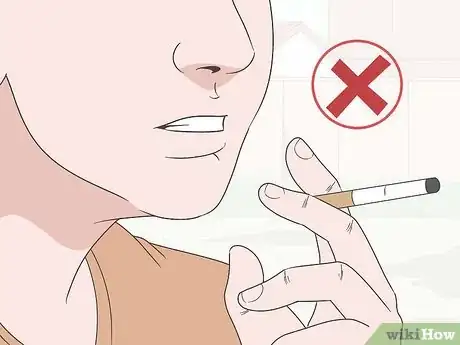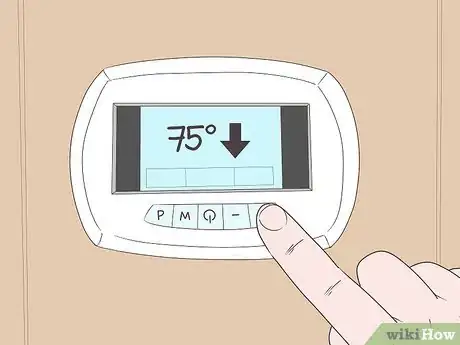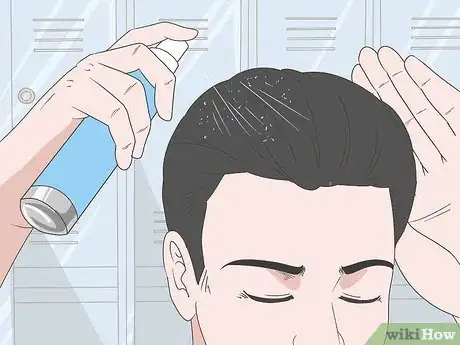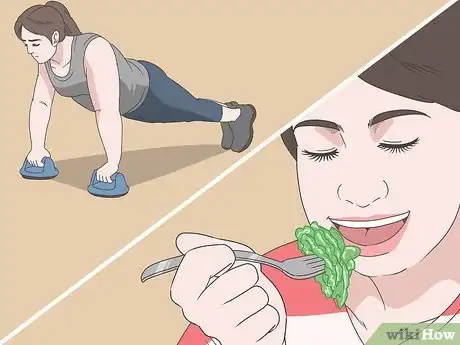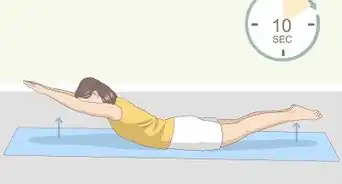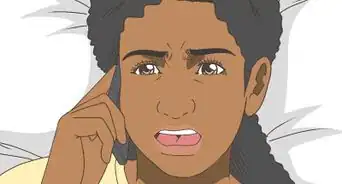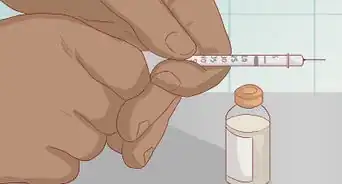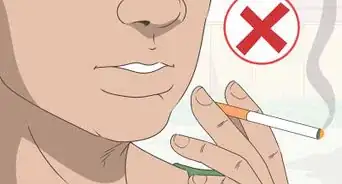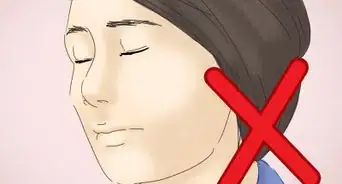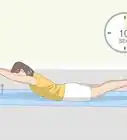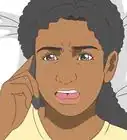This article was medically reviewed by Luba Lee, FNP-BC, MS. Luba Lee, FNP-BC is a Board-Certified Family Nurse Practitioner (FNP) and educator in Tennessee with over a decade of clinical experience. Luba has certifications in Pediatric Advanced Life Support (PALS), Emergency Medicine, Advanced Cardiac Life Support (ACLS), Team Building, and Critical Care Nursing. She received her Master of Science in Nursing (MSN) from the University of Tennessee in 2006.
There are 10 references cited in this article, which can be found at the bottom of the page.
This article has been viewed 42,849 times.
Sweating is a natural process that helps keep your body cool so it’s not something you should try to stop completely.[1] However, excessive sweating from the head can be a cause of discomfort and embarrassment. If you experience heavy head sweating, try some lifestyle changes first to see if you can reduce the symptoms. If lifestyle changes don’t work, seek medical advice from a doctor to determine whether there are any underlying medical causes or receive prescription treatments that can help reduce your head sweating symptoms.[2] With the right lifestyle changes and treatments, most people are able to reduce or eliminate annoying excessive sweating.
Steps
Making Lifestyle Changes
-
1Avoid drinking alcohol and caffeine. Beverages that contain alcohol and caffeine cause hot flashes and sweating, especially if you consume a lot of them. Limit your consumption of common caffeinated and alcoholic drinks like coffee, wine, beer, and liquor or cut them out altogether to try and get rid of your head sweating.[3]
- Alcohol and caffeine increase your heart rate and widen your blood vessels, which is why they cause excessive sweating. Sweating can also be triggered by withdrawal symptoms if you are heavily reliant on alcohol or caffeine.
-
2Stay away from spicy foods. Spicy foods make your body feel warmer, so it starts sweating to try and cool itself down. Limit your consumption of spicy foods or avoid them completely to try and stop excessive sweating from the head.[4]
- Hot peppers contain a chemical called capsaicin that triggers the nerves in your body that make it feel hotter.
Advertisement -
3Don’t smoke. Smoking is a habit that both increases your body temperature and triggers hot flashes, leading to sweating. Quit smoking if you currently smoke and don’t ever start smoking if you don’t smoke to help limit head sweating.[5]
- Nicotine releases a chemical called acetylcholine, which causes sweaty episodes.[6]
-
4Keep your indoor spaces cool. Lower the temperature on your thermostat or use a fan to cool off and help reduce sweating. This will help lower your body’s core temperature so it doesn’t sweat as much to try and cool down.[7]
- If you experience a lot of head sweating at work and you don’t have control over the temperature, get a small personal fan for your desk or other workspace.
- If you feel like you are going to get a hot flash and start sweating, drink a cold glass of water or other healthy beverage to cool down your internal temperature.
-
5Wear loose-fitting clothes. Don’t wear tight clothes, especially those made of synthetic fabrics like nylon. These raise your body temperature, reduce air flow, and increase your overall sweatiness.[8]
- The head is often one of the first places you start sweating from when your body is trying to cool down, so when other areas of your body are restricted by tight clothing it can lead to excessive head sweating.
-
6Apply antiperspirant to your scalp and head. Try using a spray-on antiperspirant if you have hair or a roll-on variety if you are bald. Apply it before bed and wash it off in the morning to see if it helps cut down on your head sweating during the day.[9]
- Be careful not to get antiperspirant in your eyes when you are applying it to your head and scalp because it can cause irritation.
Tip: If applying antiperspirant to your head and scalp irritates your skin, hydrocortisone cream can help relieve the irritation.[10]
-
7Use stress-reducing techniques to stop sweating because of stress. Try slow, deep breathing techniques when you feel stressed or anxious. Get plenty of sleep and exercise. Eat healthy, natural foods and incorporate natural stress-relieving remedies into your diet, such as herbal teas.[11]
- You could also try things like getting a massage, doing yoga, reading, and laughing more to reduce stress and relax your body and mind.
-
8Lose weight if you are overweight. Being overweight leads to excessive sweating. Start an exercise regimen and a healthy diet in order to lose weight and stop sweating excessively from your head.[12]
- This can also lead to other kinds of health benefits that help stop excessive sweating, such as improved circulation and reduced stress.
Seeking Medical Assistance
-
1Visit your doctor to determine the cause of your excessive head sweating. There are many possible underlying medical conditions that can cause excessive sweating, so visit your doctor to get examined if lifestyle changes don’t work to stop sweating from your head. Your doctor will help determine if your heavy sweating is due to a medical or non-medical condition.[13]
- Heavy sweating with no underlying medical cause is called primary hyperhidrosis. This means you just have overactive sweat glands and is a condition that can be genetic and hereditary. Heavy sweating caused by a medical condition is called secondary hyperhidrosis.[14]
- Helpful information to have on hand before you visit the doctor includes knowing whether anyone else in your family has similar sweat problems, having a list of any medications and supplements you take regularly, and knowing whether your head sweating stops while you are asleep.
- The doctor will likely ask you questions about when your symptoms started, where else on your body excessive sweating occurs, what makes the sweating worse, what makes the sweating better, and whether your head sweating is continuous or intermittent.
Warning: If your heavy head sweating is accompanied by chills, nausea, lightheadedness, chest pain, or a high fever, see a doctor immediately. If you all of a sudden begin to sweat more than usual or experience night sweats for no obvious reason, see a doctor right away.
-
2Have your doctor perform lab tests to look for a medical cause. Ask your doctor if blood, urine, or other lab tests are an option to identify a possible underlying medical condition that is causing your head sweating. Undergo the tests that your doctor recommends to determine if you have a condition like an overactive thyroid or low blood sugar.[15]
- These types of tests typically come after a more general physical examination and physical tests if you have still not been able to determine the cause of the sweating.
- If an underlying medical condition is found, a treatment plan will focus on treating that condition first. If no underlying condition is found, your doctor will focus treatment on controlling your excessive sweating.
-
3Switch to using prescription antiperspirant on your head and scalp. Ask your doctor if they think a prescription antiperspirant is right for your condition. Apply it to your head and scalp before you go to bed, being careful not to get it in your eyes, and wash it off in the morning.[16]
- Prescription antiperspirants contain aluminum chloride. As with regular antiperspirants, these products can cause irritation of the skin which can sometimes be treated with hydrocortisone cream.
-
4Try using a prescription cream on your head instead of antiperspirant. Ask your doctor about prescription creams that contain glycopyrrolate. Follow the doctor’s instructions for applying the cream to your head and scalp if they think this is the right solution for you.[17]
- Keep in mind that these types of creams are meant for treating primary hyperhidrosis in adults and children who are at least 9 years old.
-
5Use anticholinergic oral medications for a non-topical treatment. These medications block a chemical called acetylcholine that sends messages to the nerves that control your sweat glands. This can help reduce sweating all over your body, including your head and face. Ask your doctor if this is a good option for you.[18]
- Anticholinergic medications are not approved by the FDA as a treatment for excessive sweating, but your doctor can prescribe them off-label for this purpose. They’re normally used to treat a variety of conditions, such as COPD, overactive bladder issues, gastrointestinal problems, and vertigo.
- Know that possible side effects of these types of medications are blurred vision, bladder problems, and dry mouth. They can also cause cognitive problems, such as dementia, in older patients, so discuss the risks with your doctor if you’re over 65.
-
6Take antidepressants to stop sweating due to stress and anxiety. Ask your doctor to prescribe antidepressants if you are sweating a lot because of stress and anxiety. Take the pills in the prescribed doses to lower your anxiety and stop sweating from the head due to stress.[19]
- Make sure you ask your doctor about any potential side effects of the specific antidepressants they recommend.
-
7Get Botox injections to temporarily block nerves that cause sweating. Injections of botulinum toxin, or Botox, will block nerves in your head that cause excessive sweating for 6-12 months. Ask your doctor if this is a viable option for you and get Botox injections every 6-12 months to help control head sweating.[20]
- Keep in mind that this procedure can be quite painful and in some patients can cause temporary muscle weakness in the areas where they received injections.
References
- ↑ https://medlineplus.gov/ency/article/003218.htm
- ↑ https://www.mayoclinic.org/symptoms/excessive-sweating/basics/causes/sym-20050780
- ↑ https://www.nhs.uk/conditions/excessive-sweating-hyperhidrosis/
- ↑ https://www.nhs.uk/conditions/excessive-sweating-hyperhidrosis/
- ↑ https://www.mayoclinic.org/diseases-conditions/hot-flashes/diagnosis-treatment/drc-20352795
- ↑ https://www.webmd.com/skin-problems-and-treatments/ss/slideshow-sweat-causes
- ↑ https://www.mayoclinic.org/diseases-conditions/hot-flashes/diagnosis-treatment/drc-20352795
- ↑ https://www.nhs.uk/conditions/excessive-sweating-hyperhidrosis/
- ↑ https://www.nhs.uk/conditions/excessive-sweating-hyperhidrosis/
- ↑ https://medlineplus.gov/druginfo/meds/a682793.html
- ↑ https://www.mayoclinic.org/diseases-conditions/hot-flashes/diagnosis-treatment/drc-20352795
- ↑ https://www.mayoclinic.org/diseases-conditions/hot-flashes/diagnosis-treatment/drc-20352795
- ↑ https://www.mayoclinic.org/symptoms/excessive-sweating/basics/when-to-see-doctor/sym-20050780
- ↑ https://www.mayoclinic.org/diseases-conditions/hyperhidrosis/symptoms-causes/syc-20367152
- ↑ https://www.mayoclinic.org/diseases-conditions/hyperhidrosis/diagnosis-treatment/drc-20367173
- ↑ https://www.mayoclinic.org/diseases-conditions/hyperhidrosis/diagnosis-treatment/drc-20367173
- ↑ https://www.mayoclinic.org/diseases-conditions/hyperhidrosis/diagnosis-treatment/drc-20367173
- ↑ https://www.sweathelp.org/hyperhidrosis-treatments/medications.html#
- ↑ https://www.mayoclinic.org/diseases-conditions/hyperhidrosis/diagnosis-treatment/drc-20367173
- ↑ https://www.mayoclinic.org/diseases-conditions/hyperhidrosis/diagnosis-treatment/drc-20367173


